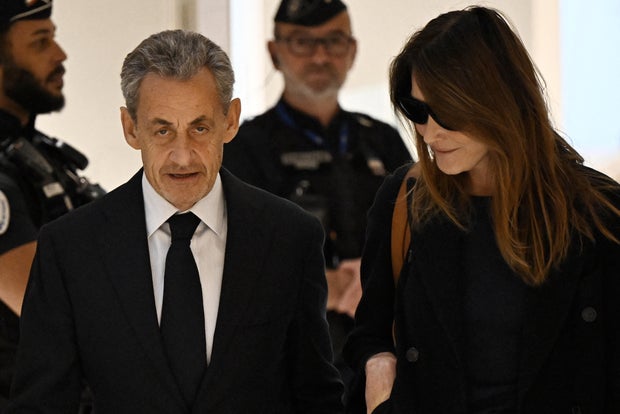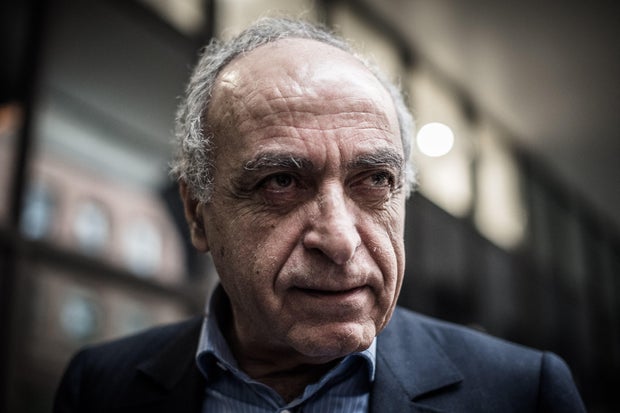Paris — A Paris court on Thursday sentenced former French President Nicolas Sarkozy to five years in prison after finding him guilty of criminal conspiracy in an alleged scheme to finance his 2007 campaign with funds from Libya. In a surprise decision, the court ruled that Sarkozy will be incarcerated even if he appeals, but it also said the date of the sentencing would come later, sparing the 70-year-old the humiliation of being led from the courtroom in handcuffs.
The court found Sarkozy guilty of criminal association in a plot from 2005 to 2007 to finance his campaign with funds from Libya, in exchange for diplomatic favors. It cleared him of three other charges, including passive corruption, illegal campaign financing and concealment of the embezzlement of public funds.
Sarkozy denounced the ruling and said he would appeal.
“This injustice is a scandal,” he said.
JULIEN DE ROSA/AFP via Getty Images
“I ask the French people — whether they voted for me or not, whether they support me or not — to grasp what has just happened. Hatred truly knows no bounds,” the former president said, adding that if he does end up behind bars, he’ll do so, “with my head held high.”
The court also found two of Sarkozy’s closest associates when he was president — former government ministers Claude Guéant and Brice Hortefeux — guilty of criminal association, likewise acquitting them of some other charges.
Overall, the ruling suggested that the court believed the men had conspired to seek Libyan funding for Sarkozy’s 2007 campaign, but that judges weren’t convinced the conservative leader himself was directly involved in the funding effort, or that any Libyan money ended up being used in his winning campaign.
The chief judge, in an hours-long reading of the lengthy verdict, said Sarkozy had allowed his close associates to reach out to Libyan authorities, “to obtain or try to obtain financial support in Libya for the purpose of securing campaign financing.”
The court said it couldn’t determine with certainty that any Libyan money ended up financing Sarkozy’s campaign.
Sarkozy stood as the judge read out the verdict. He was accompanied by his wife, singer and model Carla Bruni-Sarkozy, in the courtroom, which was also filled with reporters and members of the public. Sarkozy sat in the front row of the defendant’s section, and his three adult sons were also in the room.
Sarkozy, who was elected in 2007 but lost a bid for reelection in 2012, denied all wrongdoing during a three-month trial earlier this year, which involved 11 co-defendants, including three former ministers.
Despite multiple legal scandals that have clouded his presidential legacy, Sarkozy remains an influential figure in French right-wing politics and in entertainment circles, by virtue of his marriage to Bruni-Sarkozy.
The roots of a scandal
The accusations against him go back to 2011, when a Libyan news agency and the country’s former dictatorial leader Muammar Qaddafi himself said the Libyan state had secretly funneled millions of euros into Sarkozy’s 2007 election campaign.
In 2012, French investigative outlet Mediapart published what it said was a Libyan intelligence memo referencing a 50 million-euro funding agreement. Sarkozy denounced the document as a forgery and sued for defamation. The court said Thursday that it “now appears most likely that this document is a forgery.”
Investigators also looked into a series of trips to Libya made by people close to Sarkozy when he served as France’s interior minister, from 2005 and 2007, including his chief of staff.
In 2016, Franco-Lebanese businessman Ziad Takieddine told Mediapart that he had delivered suitcases filled with cash from Tripoli to the French Interior Ministry under Sarkozy. He later retracted his statement. That reversal is now the focus of a separate investigation into possible witness tampering.
Both Sarkozy and his wife have been preliminarily charged with involvement in alleged efforts to pressure Takieddine. That case has not gone to trial yet.
Takieddine, who was one of the co-defendants in the Sarkozy case, died Tuesday in Beirut at the age of 75. He fled to Lebanon in 2020 and did not attend the trial.
PHILIPPE LOPEZ/AFP/Getty
Prosecutors alleged that Sarkozy had knowingly benefited from what they described as a “corruption pact” with Qaddafi’s government.
Libya’s longtime dictator was toppled and killed in an uprising in 2011, ending his four-decade rule of the North African country.
The trial shed light on France’s back-channel talks with Libya in the 2000s, when Qaddafi was seeking to restore diplomatic ties with the West. Before that, Libya was considered a pariah state.
Sarkozy has dismissed the allegations as politically motivated and reliant on forged evidence. During the trial, he denounced a “plot” that he said was staged by “liars and crooks,” including the “Qaddafi clan.”
He suggested that the allegations of illegal campaign financing were retaliation for his call as France’s president for Qaddafi’s removal. Sarkozy was one of the first Western leaders to push for military intervention in Libya in 2011, when Arab Spring pro-democracy protests swept the Arab world.
“What credibility can be given to such statements marked by the seal of vengeance?” Sarkozy asked in comments during the trial.
In June, Sarkozy was stripped of his Legion of Honor medal, France’s highest civilian award, after his conviction in a separate case.
Earlier, he was found guilty of corruption and influence peddling for trying to bribe a magistrate in 2014 in exchange for information about a legal case in which he was implicated.
Sarkozy was sentenced to wear an electronic monitoring bracelet for one year. He was granted a conditional release in May due to his age, which allowed him to remove the electronic tag after he wore it for just over three months.
In another case, Sarkozy was convicted last year of illegal campaign financing in his failed 2012 reelection bid. He was accused of having spent almost twice the maximum legal amount and was sentenced to a year in prison, of which six months were suspended.
Sarkozy has denied the allegations. He has appealed that verdict to France’s highest Court of Cassation, and that appeal is pending





